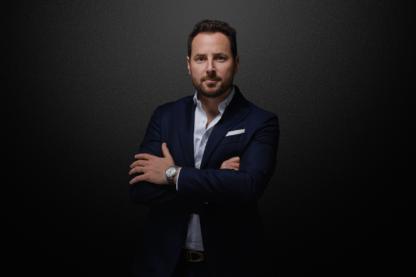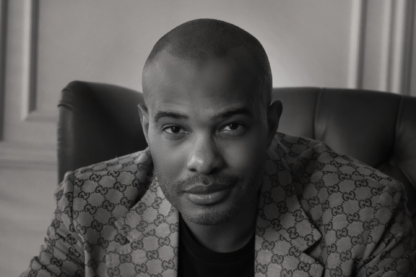In an era where legacy no longer guarantees dominance, and where digital disruption challenges centuries-old luxury traditions, few voices resonate with as much authority and insight as Ilona Orbok. Recognized by Forbes as a leading global expert in luxury, Ilona wears many hats: she’s the CEO and founder of the ICL brand, the face behind Ilona Calls Luxury on YouTube, a seasoned partner at a major international consultancy, and a familiar face to viewers of RTL’s Shark Tank. With academic roots in the elite programs of SDA Bocconi and ESSEC, her influence spans boardrooms, media screens, and international stages.
In this exclusive conversation, WLCC President Alexander Chetchikov sits down with Ilona to explore what’s driving transformation in the luxury sector—from global expansion pitfalls to regulatory pressure, from rising Startup culture to the power of storytelling in the digital age.
Alexander Chetchikov: You’re one of the few experts navigating both luxury and tax strategy at a global level. What do luxury businesses often get wrong when it comes to international expansion?
IO: As luxury brands expand internationally, they encounter a wide array of challenges: Cultural, operational, strategic, and reputational. One of the core complexities lies in the fact that luxury is not a universally defined concept. Regional preferences can differ dramatically: in markets like Japan, consumers tend to favor understated elegance, while others respond more positively to bold, conspicuous branding.
Another significant hurdle is the lack of preparedness for weak intellectual property enforcement and widespread counterfeiting in certain emerging markets. Brands must also prioritize local adaptation, tailoring products and experiences to suit distinct cultural tastes and consumer behaviors.
Economic and political risks vary across borders, requiring constant vigilance. Regulatory differences (Including import duties, taxes, and market restrictions) can significantly impact operations. A well-calibrated pricing strategy is essential to maintain brand integrity while remaining competitive.
In today’s volatile geopolitical climate, brands must navigate increasing trade barriers, shifting tax regimes, and mounting regulatory scrutiny, all of which can complicate market entry and growth. Finally, sourcing and retaining highly skilled local talent remains a persistent challenge, yet it is crucial for sustaining brand excellence and delivering authentic customer experiences.
AC: The luxury sector has seen a boom in entrepreneurial entrants. What kind of founders or ideas catch your attention as an investor?
IO: There have never been so many startups in the luxury market as there are now. Traditionally, the industry has been dominated by heritage and legacy luxury brands, often with a rich history dating back more than a hundred years. For a newcomer, it was virtually impossible to break into this elite circle. But the status quo has transformed significantly, resulting in a boom with luxury brands entering the market as startups. The market has become more flexible, more open to innovation, and we are seeing the rise of an increasing number of successful new luxury brands.
As an investor, I absolutely experience this market shift as I receive numerous inquiries from entrepreneurs regarding the launch of a new luxury product, service or brand.
I usually seek a clear and authentic narrative, often rooted in the founder’s vision or in the brand’s cultural identity. Storytelling, too, plays a vital role. Furthermore, in my view, a strong social media presence is essential for any new idea. Without it, launching a new brand is almost impossible today.
AC: How is the current regulatory environment reshaping how luxury brands think about risk and structure?
IO: The regulatory environment for luxury brands is both complex and constantly evolving, posing not only significant challenges but also strategic opportunities. Regulation acts as both a constraint and a catalyst for transformation across the industry.
Luxury houses operate within a multifaceted legal framework encompassing ESG standards, data privacy laws, and anti-counterfeiting measures. This compels them to invest heavily in compliance infrastructure, legal audits, and skilled regulatory teams. In certain jurisdictions, brands are required to form joint ventures or adopt franchise models to gain market access. Meanwhile, in regions where intellectual property protection is weak, the risks to both brand reputation and revenue can be substantial.
The European Union stands out for its strict regulatory environment, with frameworks such as the GDPR, anti-greenwashing directives, and mandatory ESG reporting. While conglomerates can centralize compliance functions and absorb the cost, independent and emerging luxury brands face disproportionately higher per-unit compliance expenses.
A new and pressing development is the implementation of the OECD’s BEPS 2.0 framework, particularly the Second Pillar, introducing a global minimum corporate tax. This initiative seeks to harmonize the tax obligations of large multinationals and will have significant implications for the tax strategies of globally operating luxury brands.
In this shifting landscape, luxury brands must design corporate structures that are resilient to regulatory shocks, transparent for compliance, and agile enough to leverage new regulatory openings. Those who succeed will not only protect their brand equity but also position themselves as leaders in a more responsible and sustainable luxury economy.
AC: What did your time on Shark Tank teach you about market-readiness in luxury-focused startups?
IO: As an investor on RTL TV’s Shark Tank business reality show, I have been seeing several promising ventures across various industries. There are fewer luxury startups on Shark Tank in the strict sense of the word, but if we define this in terms of high quality and strong brand positioning, there were a few that I was able to invest in, mostly in the food and beauty sectors.
One of the greatest values of Shark Tank is its educational nature. We push founders to think about market-readiness in real terms: valuation, customer demand, scalability, and emotional detachment from the product. That kind of exposure is invaluable for early-stage brands; it accelerates their learning curve.
Naturally, I always weighed the market potential and return on investment. Since these were financial rather than professional investments for me, having a clear exit strategy and a relatively quick return was crucial. So far, none of these investments have disappointed.
AC: You studied at SDA Bocconi and ESSEC – two of the most prestigious institutions in luxury education. What perspectives did they give you that you still apply today?
IO: One of the most important lessons I learned at SDA Bocconi Milan and ESSEC Paris is that quality, originality, and exclusivity are non-negotiable pillars of luxury. These programs helped me develop a holistic, global perspective. I also came to understand the importance of storytelling and that brand valuation in this industry follows entirely different rules compared to other sectors. Luxury brands can command the highest EBITDA multiples, up to 50 times EBITDA in some cases.
Today, I aim to share the knowledge and experience I gained through these programs, and through my work, in a more entertaining format on my YouTube channel, too.
AC: Can you share a specific tax or financial insight that every luxury brand scaling internationally should know right now?
IO: To cut a long story short, luxury brands scaling globally must be aware of the pricing of intra-group transactions, the so-called transfer pricing principles. This area is under intense scrutiny; therefore, brands need to have a proactive, well-documented transfer pricing policy.
According to the OECD BEPS 2.0, intangible assets like “brand equity” must be substantiated with economic substance. The profit splits based on actual value creation across the group, especially in the case of digital and storytelling functions, are distributed. Luxury brands with high marketing spend in-market must balance where brand value is being created. As this industry generally operates with very high profit margins, profit distribution across jurisdictions can be challenging to comply with international and local regulations.
AC: Recently, you launched your own YouTube channel, Ilona Calls Luxury.
What inspired you to step into this format, and what are you hoping to communicate to your audience through this platform?
IO: In my opinion, social media presence is crucial for luxury brands, especially in today’s digital world. Social media is no longer optional. Some of the most successful new players are built entirely on it.
I have always preferred out-of-the-box thinking. My core focus is on the economics of the luxury industry, a niche area that surprisingly few experts specialize in. I combined this interest with the storytelling culture so central to luxury and launched my Ilona Calls Luxury YouTube channel two months ago.
Though still very new, the channel experiences high interest globally, as it has already reached around 3 million people. This early traction is incredibly encouraging. To me, it proves that there is a genuine gap in the market and a real demand for a quality type of luxury storytelling and how value has been created, one I am more than happy to meet.
My main goal with these YouTube videos is to educate the audience and introduce a different kind of storytelling. I believe that the luxury industry needs this kind of aspect, especially today of uncertainty and economic turbulence. Customers want to understand the core value and history of each brand, or the trends in the luxury industry. However, these videos are also entertaining for those who are just interested in luxury, business concepts, mysteries, and stories.
Closing Words:
Ilona Orbok represents a rare blend of financial acumen, strategic foresight, and deep cultural intuition—qualities that are reshaping the luxury industry in real time. As the boundaries of luxury continue to evolve, guided by innovation, regulation, and storytelling, leaders like Ilona are not just interpreting the future; they’re actively building it.
Stay tuned to Ilona Calls Luxury for more insights!
YouTube: https://www.youtube.com/@IlonaCallsLuxury
LinkedIn: https://www.linkedin.com/in/ilona-orbok-89a36829/
Website (ICL): Home – Ilona Calls Luxury





